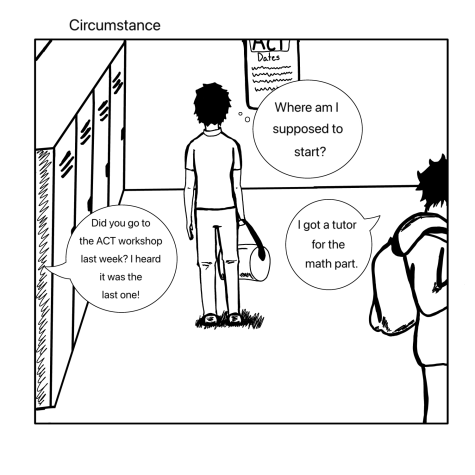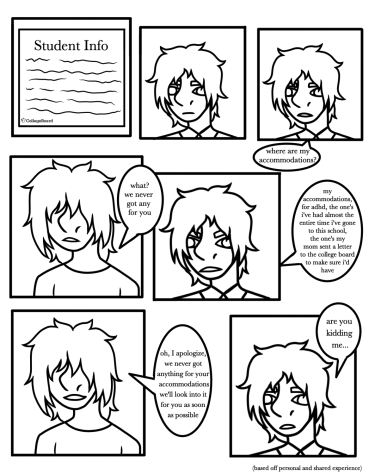TIME’S UP
Photo: Mayyadah Alzaben
Does anyone else find it ridiculous that a single four-hour test can determine your entire future?
Because I certainly do.
Standardized tests like the SAT or ACT shouldn’t be a factor in determining who receives educational opportunities and who doesn’t.
There are so many things that can influence test scores that it’s downright impossible to use them as an accurate measure of someone’s academic potential.
Maybe a student didn’t sleep well the night before and can’t remember the formula for the area of a trapezoid off the top of their head, so they don’t score as well as they otherwise would have. Is that fair?
Sure, some students can afford to retake tests over and over until everything lines up perfectly, but that doesn’t show that they’ll have more academic success than someone who couldn’t do the same.
There is a “clear correlation… between test scores and property values” according to the National Education Association. Basically, more affluent students typically scored higher on standardized tests.

I do not intend to discredit the work of students who were able to score well on standardized tests, but instead draw attention to the fact that these tests are not unbiased in their results.
Whether that’s because of increased access to tutors or something similar isn’t for me to determine, but the relationship between wealth and test scores is a concerning one.
Time is another factor, too. Some people simply don’t work quickly, and they are put at a massive disadvantage because of this. Should a student really be penalized for not being able to answer approximately one question per minute?
Not being able to work at a ridiculously high speed does not mean that a student isn’t capable, and yet the ACT and SAT are strictly timed and regulated. It’s just not fair to students.
Standardized tests don’t actually measure a student’s aptitude or intelligence, anyways. More often than not, they measure how well a student has prepared for the test and said student’s ability to perform in high-stress situations. Neither of those things accurately represent a student’s potential for success.
That’s not even getting into the troubled past of standardized tests, either. Carl Brigham, the man who essentially developed standardized tests and was commissioned by the College Board to help create the SAT, was a proponent of eugenics — the belief that intelligence is hereditary and also connected to physical characteristics such as race.

Eugenics was used to justify the actions of Nazi Germany during World War II, among other equally horrifying practices like forced sterilization and segregation. So, it’s pretty awful. And the guy who invented standardized testing as we currently know it was a really big believer in it. See why that might cause some problems?
Don’t worry, it gets worse. Colleges were able to use Brigham’s biased testing methods to “limit the admissions of particularly undesirable ethnicities,” according to the National Education Association.
In May of 2019, the College Board announced that it would be giving SAT-takers an “adversity score” along with their test scores to help assess the circumstances surrounding a student — things like their neighborhood’s crime level and average level of educational attainment, according to NPR, The National Public Radio.
But this didn’t last. Backlash caused this score to be dropped within the calendar year. While there are new systems in place to provide colleges with information about a student’s background, the legacy of standardized testing as a tool of discrimination has not changed.
Now, I’m all for assuming that we as a society have progressed past the heinous beliefs and practices of nearly 100 years ago, but if a test was quite literally designed to prove that a certain ethnicity is more intelligent, can we really rely on it for something as impactful as college admissions?
I don’t think so.







